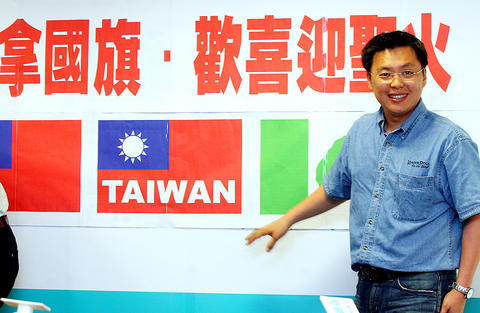Officials accused China yesterday of setting new barriers during negotiations to resolve the row over Taiwan's participation in Beijing Olympic Games torch relay.
The accusation came after Tsai Chen-wei (蔡辰威), the head of Taiwan's Olympic Committee, returned to Taipei from Beijing empty-handed on Saturday, dashing hopes that the two sides were likely to end the dispute anytime soon.
"We were caught unprepared. They created a new issue on the eve of signing the agreement," Mainland Affairs Council Chairman Chen Ming-tong (陳明通) said.

PHOTO: WANG YI-SUNG
He did not go into details, but Chinese-langugage newspapers reported that Beijing demanded that Taiwan's national flag not be displayed and its anthem not be played while the torch is here.
Chen urged Beijing to sign the agreement on the consensus previously reached, under which Taipei would be regarded as "a city of an outside territory" and Taiwan be represented by the name "Chinese Taipei."
Beijing Games organizers announced in April that the Olympic flame would visit Taiwan from Vietnam, before moving on to Hong Kong and Macau.
But Taiwan called the proposed route a challenge to its sovereignty after China claimed that the torch's arrival in Taipei would designate the start of the route's "domestic" section.
Taiwanese authorities had compromised on the arrangement of the route, but demanded an agreement that did not suggest the nation was part of China.
Asked whether Taiwan had rejected the torch plan, Premier Chang Chun-hsiung (張俊雄) said yesterday that the government has not given up on the negotiations and hopes to reach an agreement acceptable to both sides.
"Taiwan's stance is very clear. The most important thing is not to downgrade the country's sovereignty," Chang said.
Cabinet Spokesman Shieh Jhy-wey (
The pan-green camp threw its support behind the government yesterday.
When asked for comment, Taiwan Solidarity Union caucus whip Lo Chih-ming (
"How can [China] ban [Taiwan's] national flag, emblem and anthem if Taipei is considered an overseas city in the route? An `overseas city' means it belongs to another country," Lo said, adding that the restriction showed that Beijing was insincere about resolving the torch relay dispute.
Democratic Progressive Party caucus whip Wang Sing-nan (王幸男) said the nation's dignity must be the top priority if the torch is to go through Taiwan.
Chinese Nationalist Party (KMT) presidential candidate Ma Ying-jeou (馬英九) panned Beijing's move to ban the country's national flag and anthem.
"Beijing's demand is unreasonable and unfeasible. If the Olympic torch came to Taiwan, I would definitely go and welcome it carrying the national flag," Ma said yesterday during a visit to Pingtung County.
Ma said that the International Olympic Committee protocol that requires Taiwan to use a different flag and national anthem during the games did not apply to the torch route.
Additional reporting by Shih Hsiu-chuan, Mo Yan-chih
and Flora Wang

MORE VISITORS: The Tourism Administration said that it is seeing positive prospects in its efforts to expand the tourism market in North America and Europe Taiwan has been ranked as the cheapest place in the world to travel to this year, based on a list recommended by NerdWallet. The San Francisco-based personal finance company said that Taiwan topped the list of 16 nations it chose for budget travelers because US tourists do not need visas and travelers can easily have a good meal for less than US$10. A bus ride in Taipei costs just under US$0.50, while subway rides start at US$0.60, the firm said, adding that public transportation in Taiwan is easy to navigate. The firm also called Taiwan a “food lover’s paradise,” citing inexpensive breakfast stalls

TRADE: A mandatory declaration of origin for manufactured goods bound for the US is to take effect on May 7 to block China from exploiting Taiwan’s trade channels All products manufactured in Taiwan and exported to the US must include a signed declaration of origin starting on May 7, the Bureau of Foreign Trade announced yesterday. US President Donald Trump on April 2 imposed a 32 percent tariff on imports from Taiwan, but one week later announced a 90-day pause on its implementation. However, a universal 10 percent tariff was immediately applied to most imports from around the world. On April 12, the Trump administration further exempted computers, smartphones and semiconductors from the new tariffs. In response, President William Lai’s (賴清德) administration has introduced a series of countermeasures to support affected

CROSS-STRAIT: The vast majority of Taiwanese support maintaining the ‘status quo,’ while concern is rising about Beijing’s influence operations More than eight out of 10 Taiwanese reject Beijing’s “one country, two systems” framework for cross-strait relations, according to a survey released by the Mainland Affairs Council (MAC) on Thursday. The MAC’s latest quarterly survey found that 84.4 percent of respondents opposed Beijing’s “one country, two systems” formula for handling cross-strait relations — a figure consistent with past polling. Over the past three years, opposition to the framework has remained high, ranging from a low of 83.6 percent in April 2023 to a peak of 89.6 percent in April last year. In the most recent poll, 82.5 percent also rejected China’s

PLUGGING HOLES: The amendments would bring the legislation in line with systems found in other countries such as Japan and the US, Legislator Chen Kuan-ting said Democratic Progressive Party (DPP) Legislator Chen Kuan-ting (陳冠廷) has proposed amending national security legislation amid a spate of espionage cases. Potential gaps in security vetting procedures for personnel with access to sensitive information prompted him to propose the amendments, which would introduce changes to Article 14 of the Classified National Security Information Protection Act (國家機密保護法), Chen said yesterday. The proposal, which aims to enhance interagency vetting procedures and reduce the risk of classified information leaks, would establish a comprehensive security clearance system in Taiwan, he said. The amendment would require character and loyalty checks for civil servants and intelligence personnel prior to